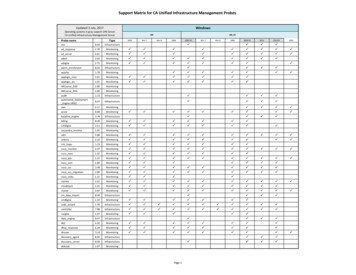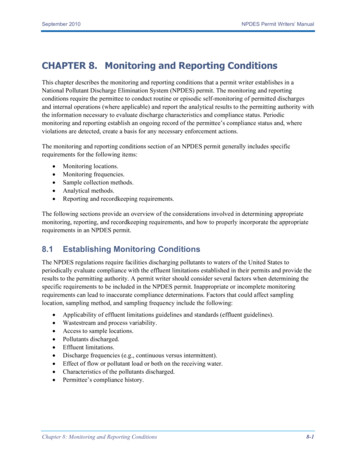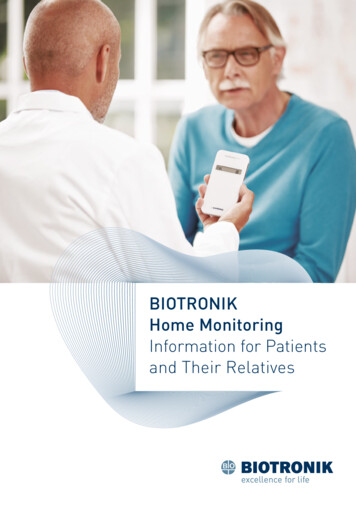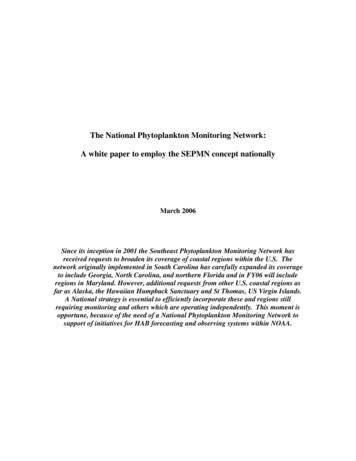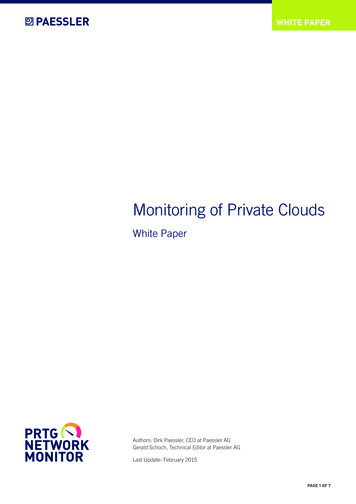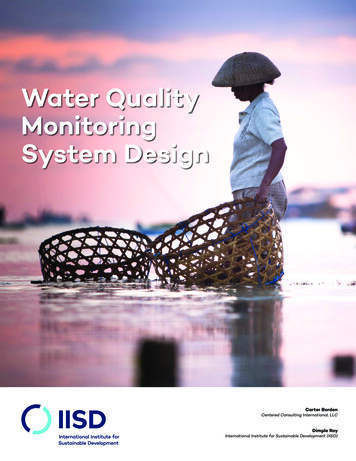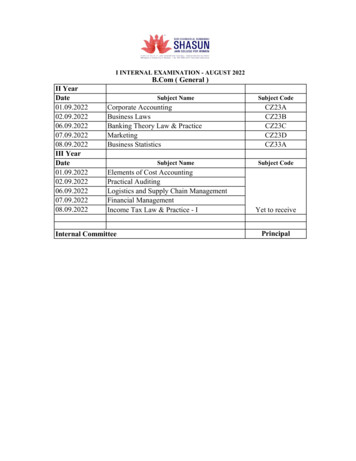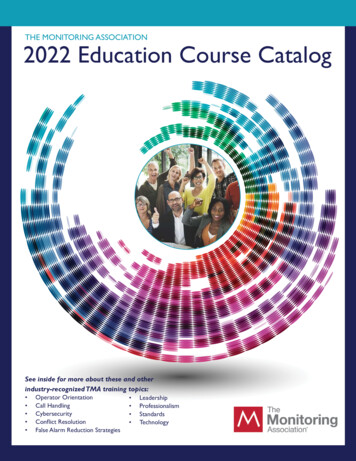
Transcription
THE MONITORING ASSOCIATION2022 Education Course CatalogSee inside for more about these and otherindustry-recognized TMA training topics: Operator OrientationCall HandlingCybersecurityConflict ResolutionFalse Alarm Reduction Strategies LeadershipProfessionalismStandardsTechnology[1]
MONITORING CENTER OPERATOR CODE OF EXCELLENCE Professionalism Reputation Confidentiality Effective Communication Customer Service Integrity Impartial Treatment Lifelong Learning Positive AttitudeDear Lifelong Learners,Welcome to your premier training resource for monitoringprofessionals. TMA is here to help you find your potential bymaintaining your highest standard of personal and professionalconduct through continuous education and certification.With life and property at stake, your ability to perform at the top ofyour game is vital. Whether you are new to the industry or a seasonedleader, TMA training is developed to introduce you to knowledge, skills,and abilities that are important to the success of your team and yourcompany. Curated and vetted by industry professionals, you will findindustry specific topics related to operations, call handling, customerservices, technology, cybersecurity, false alarm prevention, leadership,professionalism, and more.Our certification program, developed for monitoring centerprofessionals, ensures that operators are up-to-date on competenciesand demonstrates your company’s commitment to excellence inprofessional monitoring. With various topics to choose from, trainingmanagers have ready-made courses available at their fingertips tooffer as part of new hire orientation or for refresher training. TMAhas also obtained course accreditation from states that requirecertification or continuing education to maintain business licenses forprivate security providers.Not seeing something that interests you? Submit your wish list toeducation@tma.us. By constantly striving for improvement, we canwork together to promote and cultivate a healthy and effective workenvironment and provide quality service to our customers who relyon our expertise.TABLE OF CONTENTS3 Monitoring Center Operator Online TrainingLevel 1.3Level 2.47 TMA Recertification Program .7Online Access - TMATraining.org.8Bundle 1: Operations.8Bundle 2: Technology .9Bundle 3: Customer Service . 1011 General TopicsCall Handling . 11Conflict Resolution . 11Cybersecurity . 12False Alarm Reduction Strategies . 12Leadership . 12Professionalism . 13Security . 13Standards . 13Technology . 14Telecommunications . 14Video Monitoring . 1415 Pricing .15Recertification Pricing .1516 SecurityCEU.com courses .1617 CAA/NTP Field Technician.17Best regards,Julie N. WebberVice President of Education and Trainingeducation@tma.us(703) 660-4915TMA Education Committee Co-ChairsJohn Brady, TRG Associates, Inc.Brandon Niles, Acadian Monitoring Services7918 Jones Branch Road, Suite 510McLean,VA 22102www.tma.us (703) 242-4670TRAIN. MOTIVATE. ADVANCE.[2]
Monitoring Center Operator Online TrainingTMA’s Monitoring Center Operator Online Training Coursesfocus on professional monitoring in today’s evolving landscape.Produced by TMA staff and volunteers with extensive industryknowledge and training, then reviewed extensively by industryvetting partners, these courses are recognized as the goldstandard in monitoring center operator training. Courses offerindustry-focused content delivered through an absorbing andinspiring e-learning experience.Customize your in-house operator training for new employeesor provide a refresher training for established operators. Selectfrom a series of industry specific modules – each of whichreflects the most current technology capabilities and customerservice practices in today’s most effective monitoring centers.Module 2:Technology and the Monitoring CenterThis module introduces the new operator to the need-to-knowbasics of how technology works in the professional monitoringindustry. The student will discover how communications systemssupport effective monitoring and will be introduced to the maincomponents of an alarm system and how sensors, detectors andvideo work together at a protected location to save lives andproperty.Using current best practices for online learning, modulesfeature micro-learning, as well as audio and visual examples forthose with differing learning styles to enhance the experience.Each course is self-paced and typically takes about 6 hoursto complete. Students may sign up for a complete course orpurchase individual modules that vary from 30 to 90 minutes. Atthe completion of the course/module, students take a final exam.A grade of 85% or higher is passing.The student will gain an appreciation of the importance oftechnology to the advances in monitoring services.STATE LICENSING ACCREDITATIONThe states of Alabama, North Carolina, Oregon, Tennessee,and Virginia have accredited TMA courses for state licensingrequirements.Learning Objectives Understand the basics of how technology works in themonitoring center Understand how communication systems supporteffective monitoring Recognize the main components of an alarm system Describe how sensors, detectors and video are used toprotect lives and propertyCERTIFICATIONLevel 1 - Monitoring Center OperatorOnline TrainingLevel 1 is a collection of seven modules that focus on introducinga new monitoring center operator to the fundamental skillsrequired to excel in the field of professional monitoring. Thiscourse provides practical guidanceModule 1: Introduction to the Monitoring IndustryStudents will learn about the people, systems and policies ofthe professional monitoring industry with an emphasis on theimportant role of the monitoring center operator. The modulewill explore the roles and responsibilities of the people thatplay an important part of the alarm monitoring process. At theconclusion, the student will respond to various scenarios topractice contacting new connections in the industry.Module 3: Effective CommunicationThe operator will learn about the critical role communicationskills play in the monitoring center. We will begin with definingcommunication methods and apply them to speaking withcustomers, PSAPs and your team in the monitoring center.The operator will also learn how to manage difficult andemotional interactions. We will examine customer services bestpractices and the importance of effective communication in themonitoring center.Learning Objectives Understanding the Communication Cycle Applications of effective communication in themonitoring center How to speak with customers, PSAPs and your team How to identify and manage difficult interactions Your role in providing high-quality customer serviceLearning Objectives Introduce the components of the professionalmonitoring industry Identify and define the roles of the people operatorswill work with on a regular basis Practice scenario-based exercises to contactnew connectionsTRAIN. MOTIVATE. ADVANCE.[3]
Module 4:The Monitoring ProcessIn this key module, the student will learn leading industrypractices in the monitoring process. The operator is introducedto updated terminology and current best practices, services andtechnology for today’s professional monitoring center operators.The course will cover the common “go-to” resources for eventhandling and how the monitoring process works from start tofinish. Included is an explanation of the procedures for alertingcustomers or other contacts about alarm system activations. Thestudent will review and practice the top 5 event classificationsand associated response methods. The module concludes withinformation about how to stay in compliance with industry rulesand regulations.Learning Objectives The common “go-to” resources for event handling How the monitoring process works from startto finish Explain procedures for alerting customers or othercontacts about alarm system activations. The top 6 event classifications and how responsemethods differ How to stay in compliance with rulesand regulationsModule 5: False Alarm PreventionAt completion of this module, the student will understand whatfalse alarms are and how they impact the monitoring industry.The module defines the difference between a false alarmand a false dispatch and explains how laws and policies effectmonitoring center response. Most importantly, the operator willhave an understanding of his or her role in combatingfalse alarms.Learning Objectives What false alarms are and how they impactthe industry The difference between a false alarm and afalse dispatch Laws and policies regarding false alarms and how theyaffect monitoring center response The Operator’s role in combating false alarmsModule 6: Industry Readiness and MonitoringCenter SecurityIn this module, the operator will discover the importance ofmonitoring center security and readiness. The student will learnabout the different types of events that could impact monitoringcenter operations and the part operators play in respondingto issues and maintaining operations to preserve businesscontinuity.Learning Objectives Discover the types of events (man-made andenvironmental)that impact monitoringcenter operations Learn about the types of best-practice behaviorsassociated with internal processes tomaintain monitoring center security (from cybersecurityto responding to equipment failures) Understand the role of the operator in identifying andresponding to issues in order tomaintain continuityModule 7: Monitoring Center Operator Code ofExcellenceThe Monitoring Center Operator Code of Excellence is ourindustry’s commitment to promote and maintain the higheststandards of professional and personal behavior in this veryimportant role – the professional monitoring center operator.This module introduces operators to important attributes andcore values that will prepare them for success, and explain howtheir role is at the heart of, and fundamental to, the professionalmonitoring industry.Learning Objectives Overview of the nine key principles associated with theMonitoring Center Operator’s Code of Excellence How personal and professional behavior relate toprofessionalism in the workplace To identify traits associated with personal behaviorLevel 2 - Monitoring CenterOperator TrainingThe TMA Operator Level 2 Online Training Course is anappropriate next step training for anyone who has completedand passed Level 1. When life-safety and property are at risk,leadership and accountability are very important. This coursewill help operators understand why their role is so important,how they can contribute, and why processes and proceduresare in place. With technology as a powerful driver, operators willalso experience a review of how advancements have impactedmonitoring capabilities through faster telecommunications, bettervideo and audio quality, PERS devices and the impact of artificialintelligence.This companion course is self-paced and also takes about sixhours to complete all of the modules, depending on the student’sknowledge levels. At the completion of the course, students takea final exam. A grade of 85% or higher is passing.TRAIN. MOTIVATE. ADVANCE.[4]
For new hire orientation, we recommend that all studentscomplete Level 1 before taking Level 2, regardless of theirindustry experience level. Continuing education will create acommon language and improve levels of understanding andprofessionalism within your organization.Your staff will beconsistently trained, allowing them to contribute in a skilled andprofessional manner.Module 1: Leadership Skills in the Monitoring CenterTMA is committed to promote and maintain the higheststandards of professional and personal behavior in themonitoring center. This module is an introduction to importantleadership attributes and core values that will help operatorsdevelop the mindset of an effective leader and show themhow their contributions are fundamental to success within theprofessional monitoring industry.Module 3: Strategies for Advanced Call Handling in theMonitoring CenterCustomer Care is a fundamental component of the monitoringcenter and an important aspect of every operator’s role whenhandling a call. Often our communication will extend beyond thebasic operator interaction into a more involved dialogue thatrequires advanced skills and attention. This module will providestrategies to prepare the operator for advanced call handling.Our primary concern is always the safety and protection of ourcustomer’s lives and property. The operator’s professionalismand dedication to handling each call is critical when lives andproperty are at stake. This module also provides guidance onself-care after critical events.Learning Objectives Recognize best practices for customer care and callhandling Identify strategies for effective problem solving forimproved customer care Identify tips for handling escalated calls in themonitoring center Understand the impact of operator response duringcritical events Identify tips for operator self-care after critical events Recognize the importance of effective notetaking andcustomer follow upLearning Objectives Important motivations and characteristics that definegood leadership Key characteristics shared by strong leaders and managers The difference between management and leadership How to approach generational differences What new leaders should know about managing peopleModule 2: Conflict Resolution Using EffectiveTeam CommunicationsConflict in the work environment is common. Just as in families,people who work together and spend a lot of time togetherwill experience conflict. As a leader, and a member of a team,understanding how to manage yourself and your team duringtimes of conflict will improve how you communicate witheach other to resolve your differences and maximize yourperformance. This module provides the operator with toolsto identify the five main styles of conflicts. By understandingconflict preferences, or default styles, the student will gain abetter understanding of constructive ways to resolve conflict andimprove the health and productivity of a team.Learning Objectives Understand how to view conflict as an opportunity inyour role as leader Recognize the essential parts of theCommunications Process Use Leadership Roles to impact positiveteam environments Understand the five main styles of conflict and how toapply them to resolve conflict in the workplace Learn how to adjust your behavior and conflict style tohandle conflict more effectively Create a mediation environment that is conducive tohealthy conflict resolution Appreciate the link between successful conflict resolution,effective communication, and stakeholders to reinforceaccountability in the workplaceModule 4: Industry Standards:The Fundamental BuildingBlocks of Professional MonitoringStandards are an important tool in the professional monitoringindustry to help achieve efficiency, cost savings and consistencyof products and services. Compliance to standards ensureproduct functionality and compatibility for products and servicesthat support public safety. Established protocols for how weimplement technology and cybersecurity help ensure a levelof reliability throughout the alarm monitoring business. Theinformation contained in this module will expand the operator’sknowledge about each individual’s role in the compliance processand why understanding and tracking industry standards is soimportant.Learning Objectives Understand the basic history of standards andtheir purpose Recognize why compliance to these standards isimportant to the professional monitoring industry Gain a basic understanding of how standards are created,managed and enforced Recognize what role Nationally Recognized Testing Labshave with standards and how they control what goes on ina Monitoring Center Understand compliance requirements for handling alarmsignals that are subject to standardsTRAIN. MOTIVATE. ADVANCE.[5]
Module 5:Telecommunications andEnhanced TechnologyAcross our industry, advancements in technology are beingmade at a staggering rate. New technologies are enhancing orreplacing the technology used by older devices. This modulewill review how technology advancements have improvedtelecommunications, video, audio and PERS monitoring solutions.Because life safety and protection of property are essentialto the role of professional monitoring, the industry closelytracks technology that will improve the accuracy and efficiencyof monitoring systems that protect homes and businesses.This module provides an overview of current and emergingtechnology and its impact on the monitoring industry.Learning Objectives Understand the Impact of the technology evolution onthe monitoring industry Identify how the expansion of telecommunicationspaths influence monitoring and secure transmissions Understand how receivers and automation systemsbenefit from evolving technology Identify surveillance and video security game-changers Identify personal emergency responsesystem applications Emerging technology and its impact on operatorsModule 6: Cybersecurity in the Monitoring CenterEvery person in the monitoring center is key to reducing therisk of cybercrime. Operator vigilance can make a differenceand everyone’s cooperation is essential. This module will helpstudents understand how they can minimize the risk of anattack on their monitoring center by understanding more aboutcybersecurity threats, how common attacks work, when andwhere individuals and companies are vulnerable to attacks, andwhat they can do to defend their organization. Cybersecurity isnot just an IT responsibility–it is everyone’s responsibility.Learning Objectives Recognize the impact of cybersecurity threats to yourmonitoring center Identify the different types of cybersecurity risks Recognize common cybersecurity attacks Determine ways to identify and defendagainst cybercrime Identify cybersecurity best practices for employees withinthe monitoring center Use best practices to minimize your risk if you suspectyou have been targetedTRAIN. MOTIVATE. ADVANCE.[6]
TMA Recertification ProgramAs the trade association for professional monitoring, TMA hasoffered operator Level 1 and Level 2 training geared towardsreinforcing key components of meaningful operator training.Certification has been a vital component of TMA’s Five Diamonddesignation and has offered continuing education opportunitiesessential in state license compliance training. For a number ofyears, operators were only required to take the certificationcourse one time. TMA’s leadership has moved to supportperiodic recertification to demonstrate a commitment tomaintaining competency. Recertification ensures your operator’sskills and knowledge are up-to-date on the regulations and rulesthat are essential to their job and industry.TMA’s training program will now contain a recertificationcomponent for the Operator courses; previously certifiedoperators will be required to recertify every three yearsbeginning in 2021. For those participating in the Five DiamondDesignation program, the new operator recertificationrequirement will begin with the 2021-2022 renewal cycle.For a limited time Five Diamond designated companies areeligible for bulk purchase discounts. Contact fivediamond@tma.us for more information.Contact 502-254-1506 (Monday-Friday 8am-8pm ET), orSupport@TMATraining.org to purchase bundlesCompliance RequirementsThere are four options available to complete recertification:1. Retake Level 1 (2017 version); pass the exam at 85%2. Test out; Level 1 includes a test out option, a student maybypass course material and pass the Level 1 exam, if they failthey are given access to the course materials and must passthe exam at 85%3. If you have taken Level 1, you also have the option of takingLevel 2 (2020 version); pass the exam at 85%4. Complete and pass 1 of 3 bundled modules:Operations (3-4 hours to complete) Level 1/Module 4 – The Monitoring Process Level 1/Module 6 – Industry Readiness and MonitoringCenter Security Level 2/Module 4 – Industry Standards: The FundamentalBuilding Blocks of Professional Monitoring Level 1/Module 7 – Monitoring Center Operator Codeof ExcellenceCourse graduates have a two-year transition period to meetthe new recertification requirement and remain in compliance.At minimum, operators that last received their certification fiveyears ago or longer must recertify in 2021. By the end of thetwo-year transition period, each operator must be recertifiedwithin a three-year period. Full program compliance is expectedby December 31, 2022. Requests for adjustment to programcompliance deadlines will be reviewed on a case-by-case basis.Several course options are available and discounted rates will beoffered for companies wishing to purchase multiple licenses.Technology (3-4 hours to complete) Level 1/Module 2 – Technology Level 2/Module 5 – Telecommunications andEnhanced Technology Level 2/Module 6 – Cybersecurity in theMonitoring Center Level 1/Module 7 – Monitoring Center OperatorCode of ExcellenceWhy now?In order to maintain the integrity of the certifications, we areimplementing a recertification program: TMA has been providing operator certification training foralmost two decades. TMA offers the premier operator training program for theTMA Five Diamond program. Both TMA operator courses (Level 1 and Level 2) havebeen completely reworked to meet the current needs ofthe monitoring center operator. Recertification is important to support your commitmentto ongoing job-related education and testing. TMA will offer multiple options to complete recertification,for the price of 99/student, every three years. For a limitedtime, member bulk pricing will be available for purchases of10 or more recertification licenses.Customer Service (3-4 hours to complete) Level 1/Module 3 – Effective Communication Level 2/Module 2 – Conflict Resolution Using EffectiveTeam Communications Level 2/Module 3 – Strategies for Advanced CallHandling in the Monitoring Center Level 1/Module 7 – Monitoring Center Operator Codeof ExcellenceSee pages 8-10 for module descriptions within each bundle.There is also the commitment of time to complete the requiredrecertification training (about 3 to 6 hours depending on theoption you choose).TRAIN. MOTIVATE. ADVANCE.[7]
Online Access:TMATraining.orgStudents can research their certification expiration dates atTMATraining.org by logging in and checking their traininghistory by selecting View My Transcript. Access questions may bedirected to the TMA Training Helpdesk at 502-254-1506 (8am8pm ET Monday through Friday), or Support@TMATraining.org.Learning Objectives The common “go-to” resources for event handling How the monitoring process works from startto finish Explain procedures for alerting customers or othercontacts about alarm system activations. The top 6 event classifications and how responsemethods differ How to stay in compliance with rules and regulationsMember companies that regularly purchase course licenses, maysign up to use the Training Manager Tool that allows managersto easily: Purchase and assign licenses Claim/Identify students Track re-certificationSummaryOperators must recertify every three years, beginning in 2021To keep their certification status, operators that last receivedtheir certification five years ago or longer must recertify in 2021By the end of year two, all operators must be recertified within athree-year periodLevel 1 - Module 6: Industry Readiness and MonitoringCenter SecurityIn this module, the operator will discover the importance ofmonitoring center security and readiness. The student will learnabout the different types of events that could impact monitoringcenter operations and the part operators play in respondingto issues and maintaining operations to preserve businesscontinuity.Learning Objectives Discover the types of events (man-made andenvironmental) that impact monitoringcenter operations Learn about the types of best-practice behaviorsassociated with internal processes to maintain monitoringcenter security (from cybersecurity to responding toequipment failures) Understand the role of the operator in identifying andresponding to issues in order to maintain continuityFull program compliance is expected by December 31, 2022Requests for adjustment to program compliance deadlines willbe reviewed on a case-by-case basis.Bundle 1: OperationsLevel 2 - Module 4: Industry Standards:The FundamentalBuilding Blocks of Professional MonitoringStandards are an important tool in the professional monitoringindustry to help achieve efficiency, cost savings and consistencyof products and services. Compliance to standards ensureproduct functionality and compatibility for products and servicesthat support public safety. Established protocols for how weimplement technology and cybersecurity help ensure a levelof reliability throughout the alarm monitoring business. Theinformation contained in this module will expand the operator’sknowledge about each individual’s role in the compliance processand why understanding and tracking industry standards is soimportant.Level 1 - Module 4:The Monitoring ProcessIn this key module, the student will learn leading industrypractices in the monitoring process. The operator is introducedto updated terminology and current best practices, services andtechnology for today’s professional monitoring center operators.The course will cover the common “go-to” resources for eventhandling and how the monitoring process works from start tofinish. Included is an explanation of the procedures for alertingcustomers or other contacts about alarm system activations. Thestudent will review and practice the top 5 event classificationsand associated response methods. The module concludes withinformation about how to stay in compliance with industry rulesand regulations.Learning Objectives Understand the basic history of standards and theirpurpose Recognize why compliance to these standards isimportant to the professional monitoring industry Gain a basic understanding of how standards are created,managed and enforced Recognize what role Nationally Recognized Testing Labshave with standards and how they control what goes on ina Monitoring Center Understand compliance requirements for handling alarmsignals that are subject to standardsTRAIN. MOTIVATE. ADVANCE.[8]
Level 1 - Module 7: Monitoring Center OperatorCode of ExcellenceThe Monitoring Center Operator Code of Excellence is ourindustry’s commitment to promote and maintain the higheststandards of professional and personal behavior in this veryimportant role – the professional monitoring center operator.This module introduces operators to important attributes andcore values that will prepare them for success, and explain howtheir role is at the heart of, and fundamental to, the professionalmonitoring industry.Learning Objectives Overview of the nine key principles associated withthe Monitoring Center Operator’s Code of Excellence How personal and professional behavior relate toprofessionalism in the workplace To identify traits associated with personal behaviorBundle 2:TechnologyLevel 1 - Module 2:Technology and theMonitoring CenterThis module introduces the new operator to the need-to-knowbasics of how technology works in the professional monitoringindustry. The student will discover how communicationssystems support effective monitoring and will be introducedto the main components of an alarm system and how sensors,detectors and video work together at a protected location tosave lives and property. The student will gain an appreciationof the importance of technology to the advances in monitoringservices.Learning Objectives Understand the basics of how technology works in themonitoring center Understand how communication systems supporteffective monitoring Recognize the main components of an alarm system Describe how sensors, detectors and video are used toprotect lives and propertyLevel 2 - Module 5:Telecommunications andEnhanced TechnologyAcross our industry, advancements in technology are beingmade at a staggering rate. New technologies are enhancing orreplacing the technology used by older devices. This modulewill review how technology advancements have improvedtelecommunications, video, audio and PERS monitoring solutions.Because life safety and protection of property are essentialto the role of professional monitoring, the industry closelytracks technology that will improve the accuracy and efficiencyof monitoring systems that protect homes and businesses.This module provides an overview of current and emergingtechnology and its impact on the monitoring industry.Learning Objectives Understand the Impact of the technology evolution onthe monitoring industry Identify how the expansion of telecommunicationspaths influence monitoring and secure transmissions Understand how receivers and automation systemsbenefit from evolving technology Identify surveillance and video security game-changers Identify personal emergency response systemapplications Emerging technology and its impact on operatorsLevel 2 - Module 6: Cybersecurity in theMonitoring CenterEvery person in the monitori
education@tma.us. By constantly striving for improvement, we can work together to promote and cultivate a healthy and effective work environment and provide quality service to our customers who rely on our expertise. Best regards, Julie N. Webber Vice President of Education and Training education@tma.us (703) 660-4915 TMA Education Committee Co .


